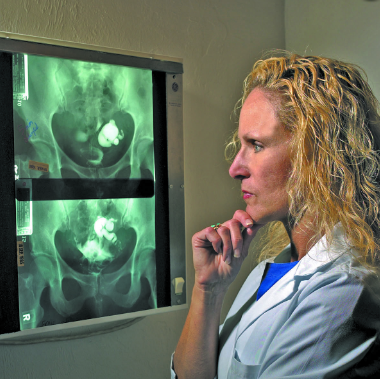What you need to know about Hysterosalpingography (HSG)
Contents
Hysterosalpingography (HSG) is a procedure that uses a special form of X-ray to look at the fallopian tubes and uterus. It is a noninvasive medical test that is often used to find out why you are having difficulty conceiving. The doctor will check if the fallopian tubes are fully or partially blocked and if the inside of the uterus is normal.
Doctors also recommend HSG to examine repeated miscarriages that may be caused by congenital or acquired uterine problems, such as adhesions, endometrial (uterine) polyps, uterine fibroids, congenital problems (uterine anomalies), tumors. In addition, HSG can check the effects of tubal surgery, including:
-
Blockage of the fallopian tubes caused by scarring or infection
-
Reopening of the fallopian tubes after sterilization or a blockage caused by a disease
-
Closing of the fallopian tubes after sterilization procedures.

What does the Procedure Involve?
During HSG, you will have to lie on your back with your knees bent on a table under an X-ray imager called a fluoroscope. Then, a device called a speculum will be inserted into your vagina. This device holds the walls of the vagina apart, keeping it open and allowing your doctor to view the cervix. The cervix is then cleaned. In most cases, no sedation is used during the procedure, but your doctor may inject local anesthesia to the end of the cervix to numb the area. You may feel a slight pinch as this is done.
Next, a contrast medium will be placed in the uterus and fallopian tubes. A contrast medium is a fluid containing a dye that can show up the structures of your body on an X-ray screen. The dye can outline the inner size and shape of your uterus and fallopian tubes. Your doctor can also see how the dye moves through your body structures.
To place the contrast, the cervix is grasped with a special device to hold it steady. Then, an instrument called a cannula is inserted into the cervix. Through the cannula, your doctor gently fills your uterus with the contrast. After that, your doctor will remove the speculum, and as the contrast medium fills your uterus and tubes, images are made with the fluoroscope X-ray. You may be asked to move around so that your doctor can get side views. It is normal to feel cramping during this part.
Finally, once the images are taken, your doctor will remove the cannula.
How Long Should I Stay in the Area?
HSG is an outpatient procedure, so you should be able to leave the hospital on the same day. In most cases, you can get the test results on the same day and discuss the results with your doctor right away, so you do not have to stay in the area any longer than you wish to. However, if the results are not immediately ready, plan to stay in the country for several days. Your doctor should give you the details.
What’s the Recovery Time?
You can resume your normal activities, including work, immediately after HSG. However, you should refrain from sexual intercourse for 2 to 3 days.
What About Aftercare?
It is also important to note that you might have some vaginal spotting, cramps, stomach discomfort, and dizziness for a few days following the procedure. You can use pads for the vaginal discharge, but make sure to avoid using a tampon. Your doctor may give you antibiotics to prevent an infection and pain medicine to help you with any cramps and discomfort. If your doctor does not prescribe you pain medicine, you can take over-the-counter pain relievers.
What’s the Success Rate?
HSG is a very safe procedure with high success rates. However, there are some complications that the procedure carries and they only occur with 1% of patients. These complications include infection, radiation exposure, fainting, allergic reaction to the contrast material, and spotting. Injury to your uterus or pelvic injury is possible as well.
The procedure is generally considered as effective and accurate most of the time. However, a small study revealed a 35% incident of false negatives. This means that the results showed a normal uterine shape, but other tests showed abnormalities. Also, 15% of women who undergo this procedure have a false-positive, meaning the results showed abnormalities when it is actually normal.
Are there Alternatives to HSG?
The following procedures can give your doctor similar information as HSG:
-
Hysteroscopy can provide a detailed view of the inside of your uterus, but it cannot give information about your fallopian tubes.
-
Laparoscopy can show if the fallopian tubes are open.
Sonohysterography can show the insides of your uterus. However, as with hysteroscopy, it cannot show whether your fallopian tubes are blocked.
What Should You Expect Before and After the Procedure
Before HSG, you may have trouble conceiving or had two or more miscarriages, or you just underwent some tubal sterilization procedures. After the procedure, your doctor should be able to find any abnormalities that are causing the problem. The results will be able to help you and your doctor creates a treatment plan. If you have HSG because you have some tubal sterilization procedures before, the results will be able to tell if your fallopian tubes have been completely blocked.
For an in-depth analysis of an HSG Procedure, watch this short video.
To check prices or to book an HSG Procedure, in Thailand or anywhere else in the world, head on over to MyMediTravel now!

